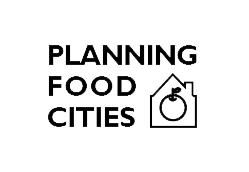Sustain • Planning Food Cities • Getting started
Does it really work?
Planning and food growing - lessons from Brighton and Hove
Food Matters (www.foodmatters.org), helped set up the Brighton & Hove Food Partnership (BHFP) and now work on national initiatives aiming to create sustainable and fair food systems. They worked with Brighton & Hove City Council to write a Planning Advice Note, originally adopted in 2011, encouraging the incorporation of community food growing space into new developments.
Over the following two years 38% of approved planning applications included community food growing. Residential planning applications included 383 sq metres of dedicated food growing provision at ground level; 142 sq metres of raised beds; 87 sq metres of food growing areas in roof gardens; 23 fruit trees and 2 nut trees.
Brighton & Hove City Council revised the Planning Advice Note in 2020 following feedback from developers on how to find creative solutions in the local context. In a BHFP blog announcing the revised PAN, Councillor Marianna Ebel, joint chair of the Tourism, Equalities, Communities & Culture committee said: “I hope the Planning Advice Note will inspire developers to embrace the opportunity to incorporate food growing into their new development plans, creating places that people will be proud to live or work in."
“Shared spaces to grow food would provide a chance to address some of the inequalities in access to productive green spaces and create developments that would align with our goal for the city to become Carbon Neutral by 2030.”
Brighton & Hove Council also has a tool that helps both developers and the planners processing applications. Their sustainability checklist is part of the validation process and includes a section on food growing. Because the tool is online, the checklist allows the Council to monitor how policy is implemented.
Food Growing and Development Planning Advisory Note (2020) Brighton and Hove City Council.
Food Growing and Planning. Lessons from Brighton and Hove (2013) Food Matters.
Making Hull a food city
Project partners Food4Hull were thrilled at their success in getting food issues on the agenda in the new draft local plan for Hull. Back in 2014, Food4Hull responded to the consultation on Issues and Options for the future of the area & pointed out how local food growing contributes to the future vision for Hull especially as health is a key priority. Late in 2015 when the first draft plan was published they were disappointed no policies specifically mentioned food growing. They submitted a robust response and in June 2016, the (almost) final draft contained a whole new section on local food growing. By December 2016, the policies and text had been further edited and they could see the results of their efforts in getting food on the planning radar. The new Local Plan was adopted in 2017 with a whole section on local food growing and a new policy. In 2020 Hull City Council published a Residential Design Guide which illustrates how growing space can be incorporated into new development even where space is limited.
The city is the third most deprived local authority area. Residents typically suffer from poorer health and lower levels of educational attainment than the national averages. So once the relevance of planning for food growing had been pointed out, the Council was amenable to using its planning powers to address this issue.
Food4Hull’s involvement in the emerging plan has enabled them to raise local food growing at an early stage of plan making to ensure it would be featured in the detail of the plan. Getting involved in plan making has needed a lot of patience. It took 4 years from the first consultation to the sight of the final plan. Now local organisations have a firm policy footing to raise awareness of the food system in Hull.
Food 4Hull underpinned the formation of Hull Food Partnership in 2016, and Hull became a Sustainable Food City in 2017.
Planning Food Cities: Find out how to get involved shaping the future of your local area to create a more sustainable and local food system.
